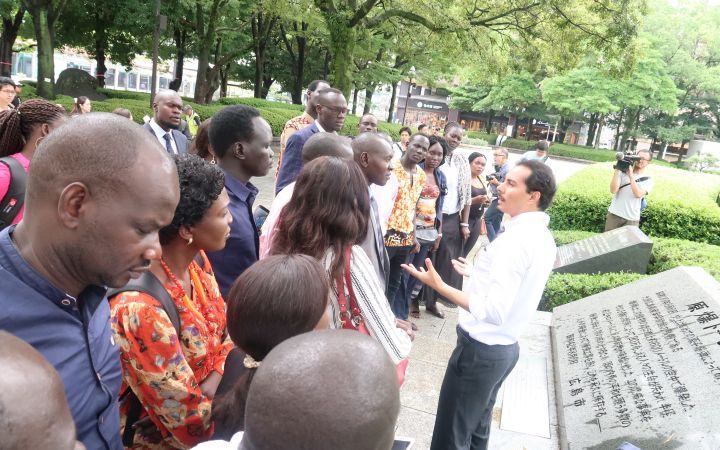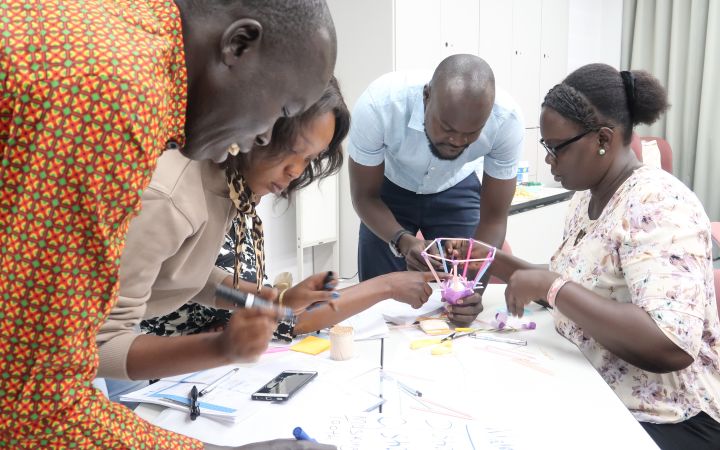- UNITAR invites young entrepreneurs, innovators, civil servants, and other actors along the agricultural value chain in South Sudan to apply to the Great Ideas Space for South Sudan 2023: Entrepreneurship and Innovation Training for Food Security.
- The training programme aims to equip participants with the knowledge, skills and network to turn ideas into a business model that combat food insecurity, create jobs, and contribute to building resilience and sustainable food systems in South Sudan.
- The deadline for the application is on 18 July 2023.
21 June 2023, Hiroshima, Japan - The United Nations Institute for Training and Research (UNITAR), Division for Prosperity invites young entrepreneurs, innovators, civil servants, and other actors along the agricultural value chain in South Sudan to apply to the Great Ideas Space for South Sudan 2023: Entrepreneurship and Innovation Training for Food Security.
The training programme aims to equip participants with the knowledge, skills, and network needed to turn their ideas for a social or for-profit enterprise into a business model that combats food insecurity, creates jobs, and contributes to building resilience and sustainable food systems in South Sudan.
It will be conducted in three phases from August 2023 to March 2024 and will be delivered in English. The programme is free for participants with the full financial support of the Government and the People of Japan. Participants will receive a UNITAR certificate of completion when completing the course and meeting minimum criteria.
Programme Structure
The programme will run in three phases:
In Phase 1, the online programme will train 75 participants from South Sudan on “The Fundamentals of Entrepreneurship and Agribusiness”. You will complete self-paced online courses, peer-to-peer discussions, and assignments, curated by UNITAR and the local and international experts in the field.
The participants who completed Phase 1 will progress to Phase 2 of the programme, where they will further design and prototype their business/projects through in-depth training on “Leadership and Innovation for Sustainable Food Systems”.
15 top-performing participants will then be selected to participate in Phase 3, which will consist of online mentoring sessions for individualized support and in-person workshop in Japan. Please note that in-person activities are subject to change depending on security and travel conditions.
Learning Objectives
By the end of the programme, you will be able to:
- Understand the agricultural value chain in South Sudan and its impact on the community and country
- Use design thinking to identify needs/issues and plan a project/enterprise that strategically, sustainably and inclusively addresses food insecurity and creates livelihood opportunities in South Sudan
- Show self-awareness, curiosity, strategic thinking, teamwork and sensitivity to society’s needs, using contemporary
Message from UNITAR alum 2020-2021
I want to serve people where my knowledge and skills will be utilized to the fullest." – Tabu Elder
Tabu Elder is a lecturer on peace and diplomacy at the University of Juba who also volunteers for community development programmes.
Tabu is already sharing what she learned from UNITAR with start-up entrepreneurs and local-business employees through her volunteer teaching work. She is also aiming to start a community project in water, sanitation and hygiene and is confident she now has the skills to set up, run, and monitor it.
ABOUT UNITAR
The United Nations Institute for Training and Research (UNITAR) is a dedicated training arm of the United Nations. In 2021, UNITAR trained 370,139 learners around the world to support their actions for a better future. In addition to our headquarters in Geneva, we have offices in Hiroshima, New York, Bonn and various networks around the world.
One of the eight divisions of UNITAR, the Division for Prosperity, based in the Hiroshima Office and Geneva Headquarters, seeks to shape an inclusive, sustainable and prosperous world. World-class learning and knowledge-sharing services on entrepreneurship, leadership, finance and trade, digital technologies, and nuclear disarmament and non-proliferation are offered. We empower individuals from developing countries – especially women and young people – to address inequalities. Our alumni are making a difference in least-developed countries, countries emerging from conflict, and small-island developing states.



